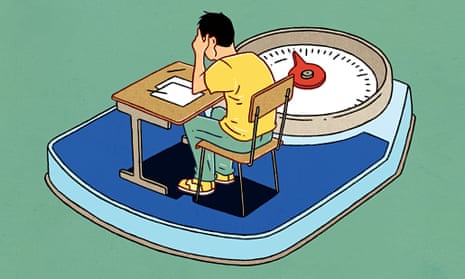In waging a war on illiteracy and innumeracy, Nicky Morgan has fallen for a fascinating delusion: “war” as a metaphor for determined, effective action. In real life war is slow and incredibly destructive; and by the time it is over, nobody can even remember what the objective was.
The education secretary’s bellicose mood takes practical shape with this suggestion: any English primary school that can’t drill times tables into every pupil by the age of 11 will be taken over by new management. Since there will always, in every school, be one kid who can’t manage it, the next government will, some time in 2017, be looking for 17,000 new headteachers. But that is by no means the most glaring flaw in Morgan’s plan.
She was billed as an emollient choice at education after the bruising Gove-ian era, when teachers and heads – and once, memorably, even governors – were portrayed as truculent, self-interested obstacles to the great reformer. Morgan was different: she was listening; she recognised that teachers, far from being the slothful creatures of Michael Gove’s imagination, were actually working far too hard.
She went as far as to ask them how hard they were working, and what they thought was the source of their workload: “Your stupid policies,” the majority replied. If only for a moment, it did look as though there was a person in charge who thought of teachers as a valuable element in the learning process. But no: that was just the friendly hand she proffered, hiding her lasso behind her back, like a dog catcher. Now we’re back to square one: a picture in which governments want the best for children, and schools don’t; governments drive learning by setting targets for schools, who would otherwise just make endless necklaces out of macaroni.
The relentless testing has already begun – as Morgan told The Andrew Marr Show this morning, the government has “introduced the phonics check for six-year-olds, and 100,000 more young people are able to read better as a result”.
Even if we leave aside the controversies around phonics-fundamentalism, and assume that teaching children words that don’t exist is the best way to introduce the joys of reading, her claim is still mistaken at the most elemental level. Testing young children doesn’t improve their reading, any more than taking the temperature will make it snow.
If we want to make data out of this new policy, all we can say for certain is that 100,000 six-year-olds have wasted 30 minutes demonstrating their progress, which is 30 minutes they could have spent learning something. Children are measured at an ever more granular level, to a narrowing set of performance indicators. It is fundamentally disrespectful to them, a cynical waste of their time for the purposes of political point-scoring.
This misunderstands the nature of learning: that individuals do different things at different rates, and the speed of one individual’s learning can vary wildly, without being anybody’s fault. It creates targets that are neither reasonable nor desirable, and then demonises teachers for “teaching to the target” having first established that they will be fired if they don’t (and replaced with the robot army that the Department for Education is presumably about to unveil).
The most infuriating thing is how all this goes unchallenged; how it is accepted as a physical and demonstrable truth that setting these targets leads to improvements. Marr referred to Morgan’s “very, very ambitious new targets”. It is impossible to interpret that as anything but approval: what he calls “ambition” is merely another layer of counting, to ensure that schools do the things that they undertake but cannot, without surveillance, be trusted to deliver.
In the 1980s the big Conservative fear was that teachers were all out to propagandise on behalf of homosexuality and that malleable children would have no choice but to become gay. The fear now is a bit more shapeless but no less preposterous: that without politicians holding the whip, the teaching body would not care about results, about where Britain stood in the international comparison tables, about who was and wasn’t literate when they got to secondary school.
I have never heard it satisfactorily explained what a teacher’s true motivation is, if it isn’t to teach children. Do they actively want to destroy the UK’s international standing, some kind of hard-left apology for colonialism? Do they seek to undermine Britain’s employers by delivering unto them people who can’t multiply 12 by 8? Are they simply people who hate children, and are prepared to devote their lives to ruining as many chances as they can? If they’re just people who want to hide from the world and have incredibly long holidays, why on earth did they become teachers and not MPs?
An interesting footnote is that all the fanfare goes on the announcement of a target: when, months or years down the line, it has not been met, there is some mumbling about how it was probably the fault of the previous government, and the charabanc moves on.
Morgan, so new to the job, has already been reprimanded by the statistics authority for misleading the House of Commons about the extent of illiteracy and innumeracy. (She said one in three kids couldn’t read or write by the age of 11; the remark had no statistical basis.) The information gathered in this massive measurement exercise is routinely papered over, misrepresented or ignored, almost as if the results were never the point. The point was to reinforce one message: teachers do not care about the future and can’t be trusted; politicians do, and can.
She has believed her own spin, it seems: Morgan really must think one in three is illiterate if she thinks we’ll swallow this.

